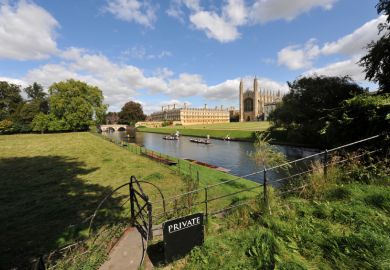The Open University’s new vice-chancellor, Tim Blackman, sees the institution as a “beacon” demonstrating the virtues of a comprehensive university, and he detects in Wales green shoots for part-time higher education that could be transplanted to nourish revival in England.
Labour’s Baroness Lee, one of the OU’s founders, envisaged it as “a great independent university” open to all, “which does not insult any man or woman whatever their background by offering them the second best: nothing but the best is good enough”.
But the outlook for one of the great collectivist British institutions of the post-war era has often been suboptimal in recent years: a collapse in part-time and mature student numbers across England after the increase in tuition fees in 2012 that created deep financial deficits; then the 2018 resignation of Peter Horrocks as vice-chancellor amid staff opposition to plans to cut courses and jobs as part of a £100 million savings drive.
Professor Blackman, the former vice-chancellor of Middlesex University, appears to have a closer connection to the institution’s founding ethos, having long advocated comprehensive universities as an antidote to the social division deepened by England’s hyper-selective and socially exclusive universities.
The OU’s “role still is, in many ways, as the guarantor of higher education in the UK being inclusive and equitable”, Professor Blackman, who took up the post in October in a year when the institution marked its 50th anniversary, told Times Higher Education.
And in the “fourth industrial age”, the OU is “more important than we’ve ever been”, he added.
He highlighted the OU’s ability to “develop that digital literacy that so many employers are looking for”, apprenticeship student numbers “heading for 2,000” by the end of this year and a drive to increase its provision of microcredentials offering rapid workplace upskilling – particularly via the digital platform FutureLearn, which the OU jointly owns – as examples “where we’re adapting to the needs of the modern, high-tech workplace”.
In his eyes, the OU is “not just a university; we’re a whole movement for change”, Professor Blackman said, suggesting that it has a “role as an educational institution to step out into the public space and engage the public, inform the public and encourage the public to be critical thinkers in this age of populist politics and misinformation”. The university has a “unique commitment in our charter to serve the wider educational well-being of the community”, he pointed out.
The OU has a free online platform, OpenLearn, and its academics work on major television programmes, giving the university an ability to “mobilise the public”, said Professor Blackman. He cited the example of the BBC-OU series Blue Planet II, presented by Sir David Attenborough, which “caused a whole movement in this country to stop the wasteful use of plastics”.
Meanwhile, the OU’s future in terms of student recruitment is beginning to look rosier after years of gloom. There has been a “9 per cent increase in our student numbers across the UK” this year, which is “particularly being driven” by a rise in numbers in Wales, where growth is “policy-driven [as] support for part-time students is considerably better than in England”, said Professor Blackman.
While it is common for politicians of all parties to lament the effect of the 2012 English fee increases on part-time higher education, Professor Blackman said “we need our politicians to stop just admiring the problem”.
It is “a major injustice that part-time learners studying as distance learners can’t even, in England, access maintenance loans”, he said.
In Wales, the combination of generous maintenance loans and grants for part-time students has been a “game changer”, said Professor Blackman. This has driven a “50 per cent increase in our students in Wales, but it’s having an effect on retention and progression as well”, he added. Wales shows “what can be done and what the effect of appropriate policy measures is”, he argued.
In terms of how the OU fits into the wider sector, Professor Blackman said that he remained “very concerned about the degree of academic selectivity and stratification in our higher education system”, arguing there would be both social and educational benefits to creating socially diverse universities because “diversity is a rich learning environment”.
The “vast majority” of OU courses are “open access” with no entry requirements, said Professor Blackman. The student population is thus “broadly representative of the adult population across the UK. We’re not just an access university; we’re a university that’s for everybody.”
In the future, he predicted, the concept of comprehensive universities would be most likely to break through in local mergers “where you get a post-92 and a Russell Group university in the same city” opting “to create a new type of mission that is much more attuned to the contemporary importance of diversity”.
“But, at the moment,” he added, “it’s the OU that is the beacon of how you do this.”
POSTSCRIPT:
Print headline: OU a ‘beacon’ for virtues of comprehensive universities
Register to continue
Why register?
- Registration is free and only takes a moment
- Once registered, you can read 3 articles a month
- Sign up for our newsletter
Subscribe
Or subscribe for unlimited access to:
- Unlimited access to news, views, insights & reviews
- Digital editions
- Digital access to THE’s university and college rankings analysis
Already registered or a current subscriber?








